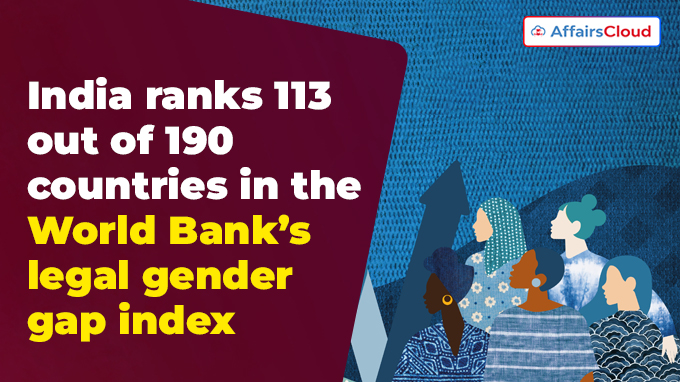 According to the 10th edition of Women, Business, and the Law (WBL) 2024 report released by the World Bank Group, India has climbed to 113th place out of 190 countries in the Index, with a score of 74.4%. For the first time, WBL assesses the gap between legal reforms and actual outcomes for women in 190 economies.
According to the 10th edition of Women, Business, and the Law (WBL) 2024 report released by the World Bank Group, India has climbed to 113th place out of 190 countries in the Index, with a score of 74.4%. For the first time, WBL assesses the gap between legal reforms and actual outcomes for women in 190 economies.
- The index shows that in India, women enjoy 60% of the legal rights granted to men, which is lower than the global average of 64.2%.
- Despite challenges, India outperforms its South Asian counterparts, where women enjoy 45.9% of the legal protections provided to men.
About Women, Business and the Law (WBL) 2024:
i.It is a pivotal annual study, dedicated to assessing the conducive environment for women’s economic participation across 190 economies.
ii.In 2024, the study presents 2 sets of data: WBL 1.0 and an expanded version, WBL 2.0.
iii.WBL 1.0 updates its index of 8 indicators such as Mobility, Workplace, Pay, Marriage, Parenthood, Entrepreneurship, Assets, and Pension.
iv.WBL 2.0 presents a new framework for measuring the implementation gap.
- It analyses legal frameworks, supportive frameworks, and expert opinions on the status of women’s rights and introduces 2 new indicators namely Safety, and Childcare.
v.The data in WBL 2024 is current as of October 1, 2023, ensuring relevance and accuracy in understanding the contemporary landscape.
Top 10 based on WBL 1.0 score:
| Rank | Economy | WBL 1.0 legal frameworks score |
|---|---|---|
| 1 | Belgium; Canada; Denmark; France; Germany; Greece; Iceland; Ireland; Latvia; Luxembourg; Netherlands; Portugal; Spain; Sweden | 100.0 |
| 2 | Estonia; Finland; Italy; New Zealand; Togo; United Kingdom | 97.5 |
| 3 | Australia; Austria; Cyprus; Norway; Norway; Slovenia | 96.9 |
| 4 | Côte d’Ivoire; Gabon; Peru | 95.0 |
| 5 | Paraguay | 94.4 |
| 6 | Croatia; Czechia; Hungary; Lithuania; Poland; Serbia | 93.8 |
| 7 | Sierra Leone | 92.5 |
| 8 | Costa Rica; Hong Kong SAR(China); Kosovo; Rwanda | 91.9 |
| 9 | Albania; Malta; Taiwan(China); United States of America | 91.3 |
| 10 | Armenia; Bulgaria; Moldova; Mongolia; Romania | 90.6 |
| 113 | India | 74.4 |
Performance Trends:
i.India’s score has remained at 74.4% since 2021.
ii.However, the ranking has declined from 122 in 2021 to 126 in the 2023 index.
Supportive Frameworks:
i.India’s performance is lacking in supportive frameworks including measures like national policies, plans, programs, etc.
ii.Only 54.2% of supportive frameworks required for promoting law are established.
- Globally, the average is much lower at 39.5%.
Labour Force Participation:
i.India aims to boost the female labour force participation rate.
ii.At 37% in 2022-23, it lags behind advanced economies like the Organization for Economic Cooperation and Development (OECD) countries, which boasted a rate slightly over 50% in 2022.
Recommendations:
The lowest indicator in the framework was childcare, the report suggests the need for a publicly accessible registry for childcare providers and well-defined application processes for parents.
Key Findings:
Global Perspective:
In legal distinctions related to violence and childcare, women possess only 64% of the legal rights enjoyed by men globally.
- Earlier estimates projected women had 77% of the rights.
Gender Gap:
i.No country achieved a full score, indicating global disparities.
ii.Closing the gender gap could boost global Gross domestic product (GDP) by over 20%, essentially doubling the global growth rate over the next decade.
iii.There is a substantial implementation gap, between countries, less than 40% of the required systems for full implementation are established on average.
Economic Potential:
i.Removing discriminatory laws and practices hindering women from working or initiating businesses could lead to a 20% increase in global GDP.
ii.It has the potential to double the rate of global growth in the next decade.
Pay Gap Measures:
While 98 economies mandate equal pay for women, less than 1 in 5 address the pay gap effectively.
Recent related News:
On January 9, 2024, the World Bank (WB) released its ‘January 2024 Global Economic Prospects’ (GEP) report projecting a third consecutive year of slowdown for global Gross Domestic Product (GDP) growth with a decrease to 2.4% in 2024. It was 2.6% in 2023, 3% in 2022 and 6.2% in 2021.
About World Bank (WB):
President (WB Group)- Ajay Banga
Headquarters– Washington, DC, USA
Established in– 1944




